Entrepreneurship & Small Business Management: Ventures & Impact Report
VerifiedAdded on 2020/10/04
|15
|5489
|235
Report
AI Summary
This report provides an overview of entrepreneurship and small business management, focusing on different types of entrepreneurial ventures, their relation to typology, and the similarities and differences between them. It evaluates the impact of micro and small businesses on the economy, highlighting their role as the backbone of the economic system and their contributions to employment and revenue. The report also explores the importance of small businesses and start-ups in the growth of the social economy, including definitions of social enterprise and social economy, along with an explanation of Corporate Social Responsibilities (CSR). Furthermore, it discusses the characteristics and skills of successful entrepreneurs, aspects of entrepreneurial personality, and how background and experience can either hinder or foster entrepreneurship. Desklib offers a range of similar assignments and study tools for students.

Entrepreneurship and small
business management
business management
Paraphrase This Document
Need a fresh take? Get an instant paraphrase of this document with our AI Paraphraser
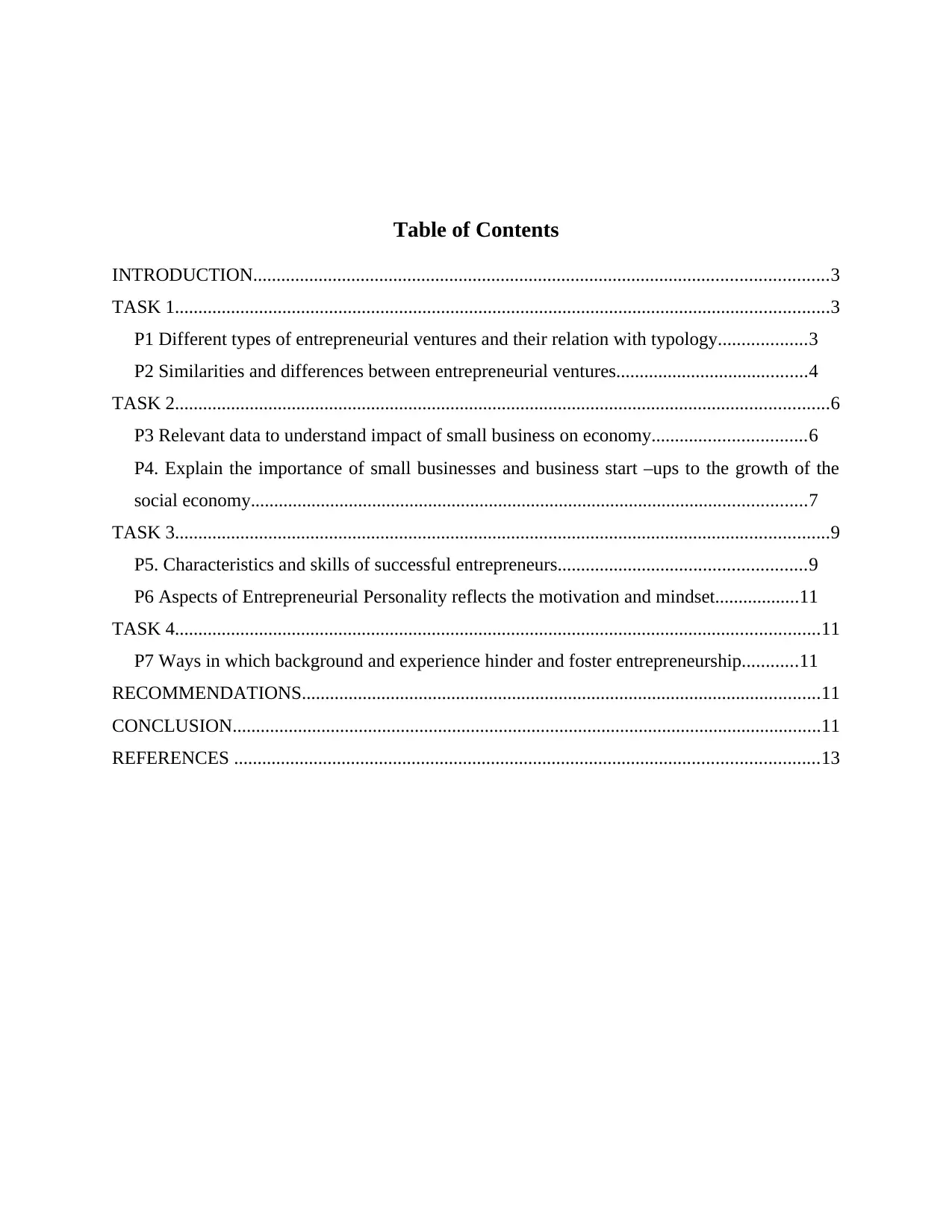
Table of Contents
INTRODUCTION...........................................................................................................................3
TASK 1............................................................................................................................................3
P1 Different types of entrepreneurial ventures and their relation with typology...................3
P2 Similarities and differences between entrepreneurial ventures.........................................4
TASK 2............................................................................................................................................6
P3 Relevant data to understand impact of small business on economy.................................6
P4. Explain the importance of small businesses and business start –ups to the growth of the
social economy.......................................................................................................................7
TASK 3............................................................................................................................................9
P5. Characteristics and skills of successful entrepreneurs.....................................................9
P6 Aspects of Entrepreneurial Personality reflects the motivation and mindset..................11
TASK 4..........................................................................................................................................11
P7 Ways in which background and experience hinder and foster entrepreneurship............11
RECOMMENDATIONS...............................................................................................................11
CONCLUSION..............................................................................................................................11
REFERENCES .............................................................................................................................13
INTRODUCTION...........................................................................................................................3
TASK 1............................................................................................................................................3
P1 Different types of entrepreneurial ventures and their relation with typology...................3
P2 Similarities and differences between entrepreneurial ventures.........................................4
TASK 2............................................................................................................................................6
P3 Relevant data to understand impact of small business on economy.................................6
P4. Explain the importance of small businesses and business start –ups to the growth of the
social economy.......................................................................................................................7
TASK 3............................................................................................................................................9
P5. Characteristics and skills of successful entrepreneurs.....................................................9
P6 Aspects of Entrepreneurial Personality reflects the motivation and mindset..................11
TASK 4..........................................................................................................................................11
P7 Ways in which background and experience hinder and foster entrepreneurship............11
RECOMMENDATIONS...............................................................................................................11
CONCLUSION..............................................................................................................................11
REFERENCES .............................................................................................................................13
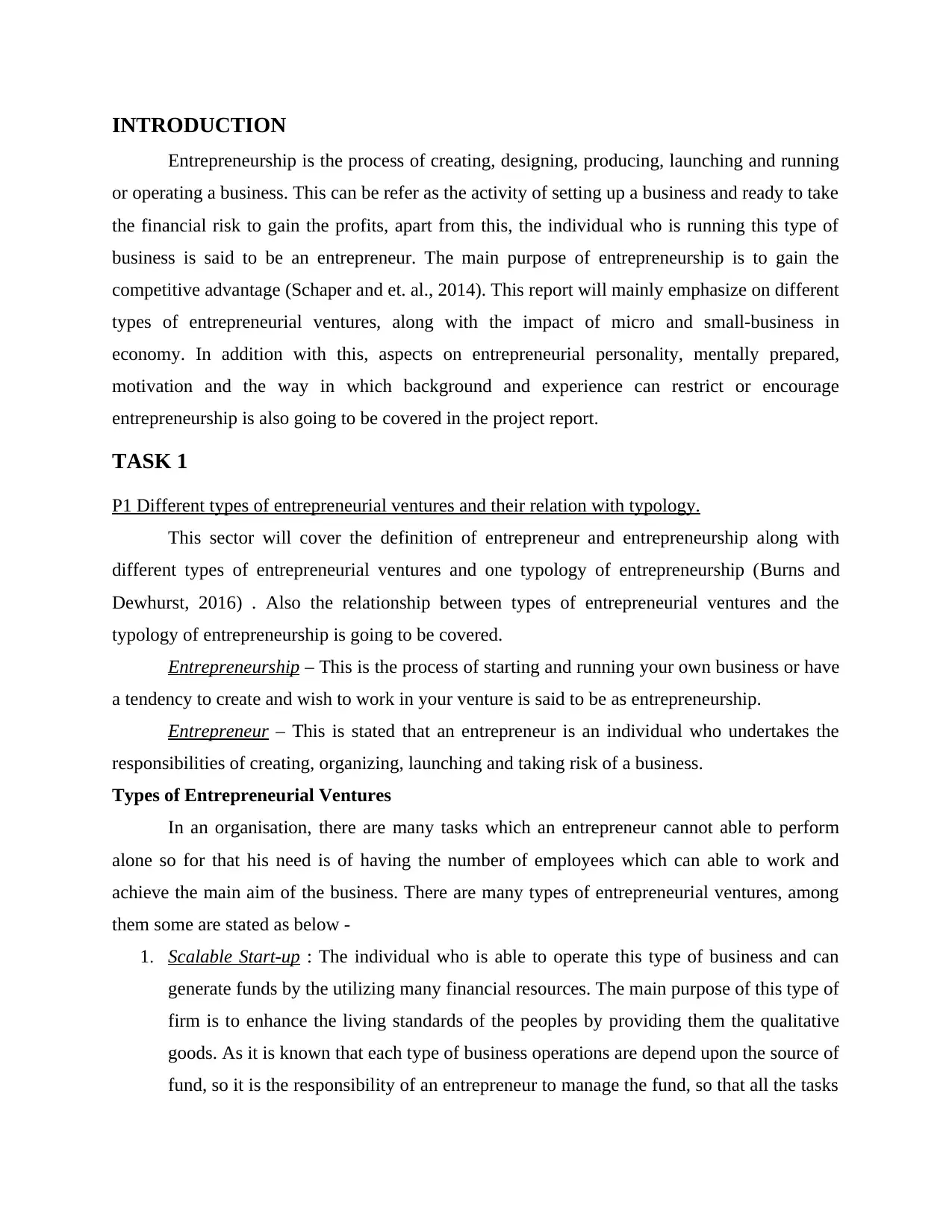
INTRODUCTION
Entrepreneurship is the process of creating, designing, producing, launching and running
or operating a business. This can be refer as the activity of setting up a business and ready to take
the financial risk to gain the profits, apart from this, the individual who is running this type of
business is said to be an entrepreneur. The main purpose of entrepreneurship is to gain the
competitive advantage (Schaper and et. al., 2014). This report will mainly emphasize on different
types of entrepreneurial ventures, along with the impact of micro and small-business in
economy. In addition with this, aspects on entrepreneurial personality, mentally prepared,
motivation and the way in which background and experience can restrict or encourage
entrepreneurship is also going to be covered in the project report.
TASK 1
P1 Different types of entrepreneurial ventures and their relation with typology.
This sector will cover the definition of entrepreneur and entrepreneurship along with
different types of entrepreneurial ventures and one typology of entrepreneurship (Burns and
Dewhurst, 2016) . Also the relationship between types of entrepreneurial ventures and the
typology of entrepreneurship is going to be covered.
Entrepreneurship – This is the process of starting and running your own business or have
a tendency to create and wish to work in your venture is said to be as entrepreneurship.
Entrepreneur – This is stated that an entrepreneur is an individual who undertakes the
responsibilities of creating, organizing, launching and taking risk of a business.
Types of Entrepreneurial Ventures
In an organisation, there are many tasks which an entrepreneur cannot able to perform
alone so for that his need is of having the number of employees which can able to work and
achieve the main aim of the business. There are many types of entrepreneurial ventures, among
them some are stated as below -
1. Scalable Start-up : The individual who is able to operate this type of business and can
generate funds by the utilizing many financial resources. The main purpose of this type of
firm is to enhance the living standards of the peoples by providing them the qualitative
goods. As it is known that each type of business operations are depend upon the source of
fund, so it is the responsibility of an entrepreneur to manage the fund, so that all the tasks
Entrepreneurship is the process of creating, designing, producing, launching and running
or operating a business. This can be refer as the activity of setting up a business and ready to take
the financial risk to gain the profits, apart from this, the individual who is running this type of
business is said to be an entrepreneur. The main purpose of entrepreneurship is to gain the
competitive advantage (Schaper and et. al., 2014). This report will mainly emphasize on different
types of entrepreneurial ventures, along with the impact of micro and small-business in
economy. In addition with this, aspects on entrepreneurial personality, mentally prepared,
motivation and the way in which background and experience can restrict or encourage
entrepreneurship is also going to be covered in the project report.
TASK 1
P1 Different types of entrepreneurial ventures and their relation with typology.
This sector will cover the definition of entrepreneur and entrepreneurship along with
different types of entrepreneurial ventures and one typology of entrepreneurship (Burns and
Dewhurst, 2016) . Also the relationship between types of entrepreneurial ventures and the
typology of entrepreneurship is going to be covered.
Entrepreneurship – This is the process of starting and running your own business or have
a tendency to create and wish to work in your venture is said to be as entrepreneurship.
Entrepreneur – This is stated that an entrepreneur is an individual who undertakes the
responsibilities of creating, organizing, launching and taking risk of a business.
Types of Entrepreneurial Ventures
In an organisation, there are many tasks which an entrepreneur cannot able to perform
alone so for that his need is of having the number of employees which can able to work and
achieve the main aim of the business. There are many types of entrepreneurial ventures, among
them some are stated as below -
1. Scalable Start-up : The individual who is able to operate this type of business and can
generate funds by the utilizing many financial resources. The main purpose of this type of
firm is to enhance the living standards of the peoples by providing them the qualitative
goods. As it is known that each type of business operations are depend upon the source of
fund, so it is the responsibility of an entrepreneur to manage the fund, so that all the tasks
⊘ This is a preview!⊘
Do you want full access?
Subscribe today to unlock all pages.

Trusted by 1+ million students worldwide
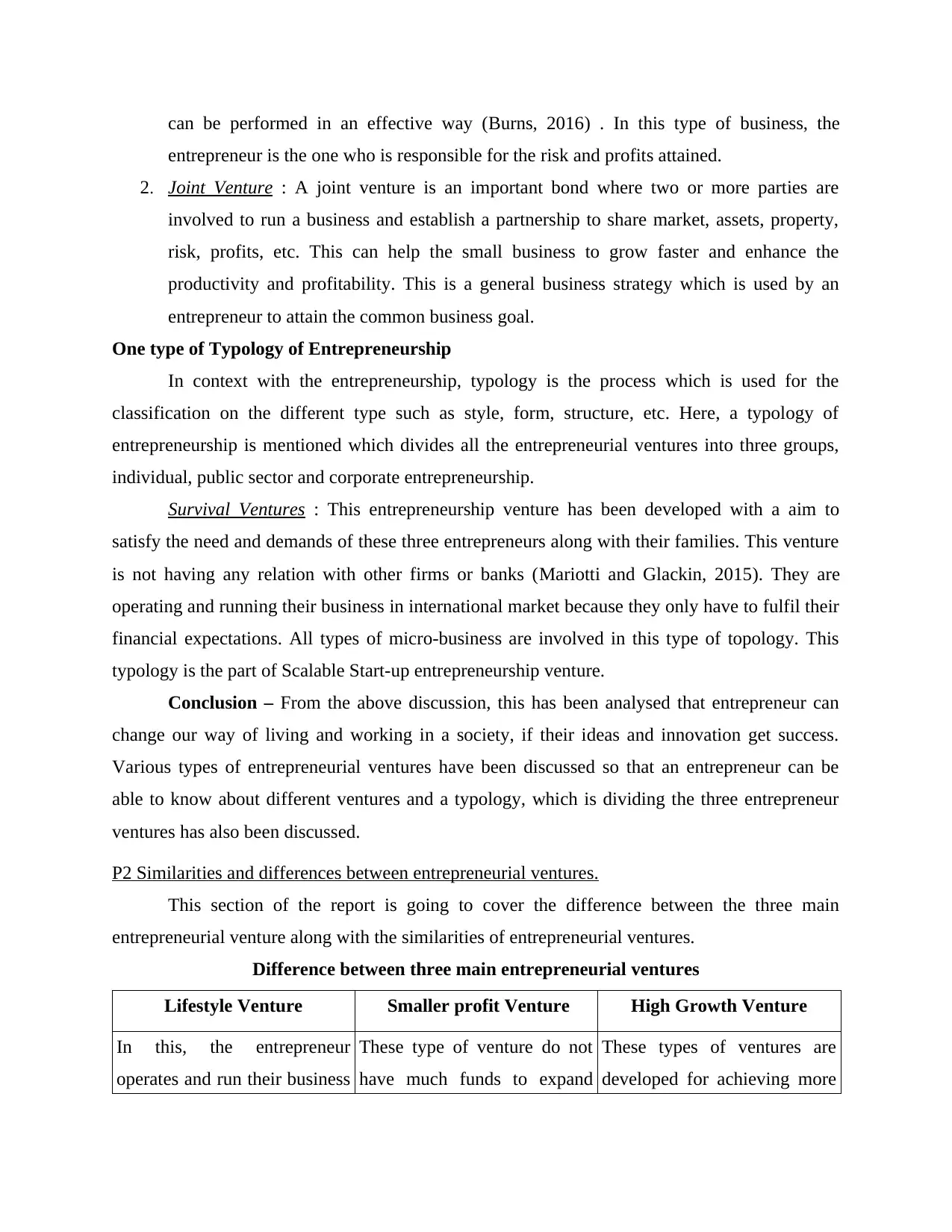
can be performed in an effective way (Burns, 2016) . In this type of business, the
entrepreneur is the one who is responsible for the risk and profits attained.
2. Joint Venture : A joint venture is an important bond where two or more parties are
involved to run a business and establish a partnership to share market, assets, property,
risk, profits, etc. This can help the small business to grow faster and enhance the
productivity and profitability. This is a general business strategy which is used by an
entrepreneur to attain the common business goal.
One type of Typology of Entrepreneurship
In context with the entrepreneurship, typology is the process which is used for the
classification on the different type such as style, form, structure, etc. Here, a typology of
entrepreneurship is mentioned which divides all the entrepreneurial ventures into three groups,
individual, public sector and corporate entrepreneurship.
Survival Ventures : This entrepreneurship venture has been developed with a aim to
satisfy the need and demands of these three entrepreneurs along with their families. This venture
is not having any relation with other firms or banks (Mariotti and Glackin, 2015). They are
operating and running their business in international market because they only have to fulfil their
financial expectations. All types of micro-business are involved in this type of topology. This
typology is the part of Scalable Start-up entrepreneurship venture.
Conclusion – From the above discussion, this has been analysed that entrepreneur can
change our way of living and working in a society, if their ideas and innovation get success.
Various types of entrepreneurial ventures have been discussed so that an entrepreneur can be
able to know about different ventures and a typology, which is dividing the three entrepreneur
ventures has also been discussed.
P2 Similarities and differences between entrepreneurial ventures.
This section of the report is going to cover the difference between the three main
entrepreneurial venture along with the similarities of entrepreneurial ventures.
Difference between three main entrepreneurial ventures
Lifestyle Venture Smaller profit Venture High Growth Venture
In this, the entrepreneur
operates and run their business
These type of venture do not
have much funds to expand
These types of ventures are
developed for achieving more
entrepreneur is the one who is responsible for the risk and profits attained.
2. Joint Venture : A joint venture is an important bond where two or more parties are
involved to run a business and establish a partnership to share market, assets, property,
risk, profits, etc. This can help the small business to grow faster and enhance the
productivity and profitability. This is a general business strategy which is used by an
entrepreneur to attain the common business goal.
One type of Typology of Entrepreneurship
In context with the entrepreneurship, typology is the process which is used for the
classification on the different type such as style, form, structure, etc. Here, a typology of
entrepreneurship is mentioned which divides all the entrepreneurial ventures into three groups,
individual, public sector and corporate entrepreneurship.
Survival Ventures : This entrepreneurship venture has been developed with a aim to
satisfy the need and demands of these three entrepreneurs along with their families. This venture
is not having any relation with other firms or banks (Mariotti and Glackin, 2015). They are
operating and running their business in international market because they only have to fulfil their
financial expectations. All types of micro-business are involved in this type of topology. This
typology is the part of Scalable Start-up entrepreneurship venture.
Conclusion – From the above discussion, this has been analysed that entrepreneur can
change our way of living and working in a society, if their ideas and innovation get success.
Various types of entrepreneurial ventures have been discussed so that an entrepreneur can be
able to know about different ventures and a typology, which is dividing the three entrepreneur
ventures has also been discussed.
P2 Similarities and differences between entrepreneurial ventures.
This section of the report is going to cover the difference between the three main
entrepreneurial venture along with the similarities of entrepreneurial ventures.
Difference between three main entrepreneurial ventures
Lifestyle Venture Smaller profit Venture High Growth Venture
In this, the entrepreneur
operates and run their business
These type of venture do not
have much funds to expand
These types of ventures are
developed for achieving more
Paraphrase This Document
Need a fresh take? Get an instant paraphrase of this document with our AI Paraphraser
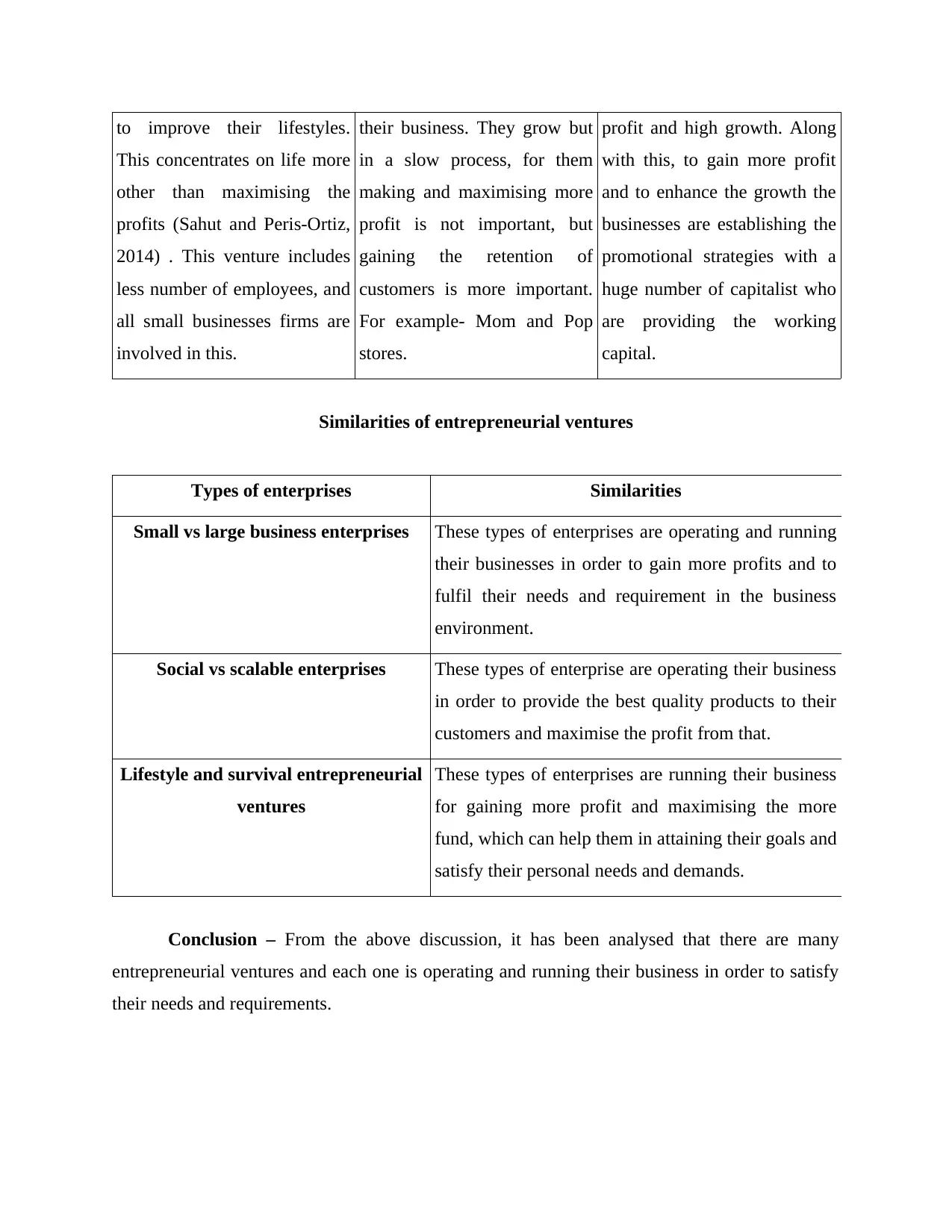
to improve their lifestyles.
This concentrates on life more
other than maximising the
profits (Sahut and Peris-Ortiz,
2014) . This venture includes
less number of employees, and
all small businesses firms are
involved in this.
their business. They grow but
in a slow process, for them
making and maximising more
profit is not important, but
gaining the retention of
customers is more important.
For example- Mom and Pop
stores.
profit and high growth. Along
with this, to gain more profit
and to enhance the growth the
businesses are establishing the
promotional strategies with a
huge number of capitalist who
are providing the working
capital.
Similarities of entrepreneurial ventures
Types of enterprises Similarities
Small vs large business enterprises These types of enterprises are operating and running
their businesses in order to gain more profits and to
fulfil their needs and requirement in the business
environment.
Social vs scalable enterprises These types of enterprise are operating their business
in order to provide the best quality products to their
customers and maximise the profit from that.
Lifestyle and survival entrepreneurial
ventures
These types of enterprises are running their business
for gaining more profit and maximising the more
fund, which can help them in attaining their goals and
satisfy their personal needs and demands.
Conclusion – From the above discussion, it has been analysed that there are many
entrepreneurial ventures and each one is operating and running their business in order to satisfy
their needs and requirements.
This concentrates on life more
other than maximising the
profits (Sahut and Peris-Ortiz,
2014) . This venture includes
less number of employees, and
all small businesses firms are
involved in this.
their business. They grow but
in a slow process, for them
making and maximising more
profit is not important, but
gaining the retention of
customers is more important.
For example- Mom and Pop
stores.
profit and high growth. Along
with this, to gain more profit
and to enhance the growth the
businesses are establishing the
promotional strategies with a
huge number of capitalist who
are providing the working
capital.
Similarities of entrepreneurial ventures
Types of enterprises Similarities
Small vs large business enterprises These types of enterprises are operating and running
their businesses in order to gain more profits and to
fulfil their needs and requirement in the business
environment.
Social vs scalable enterprises These types of enterprise are operating their business
in order to provide the best quality products to their
customers and maximise the profit from that.
Lifestyle and survival entrepreneurial
ventures
These types of enterprises are running their business
for gaining more profit and maximising the more
fund, which can help them in attaining their goals and
satisfy their personal needs and demands.
Conclusion – From the above discussion, it has been analysed that there are many
entrepreneurial ventures and each one is operating and running their business in order to satisfy
their needs and requirements.
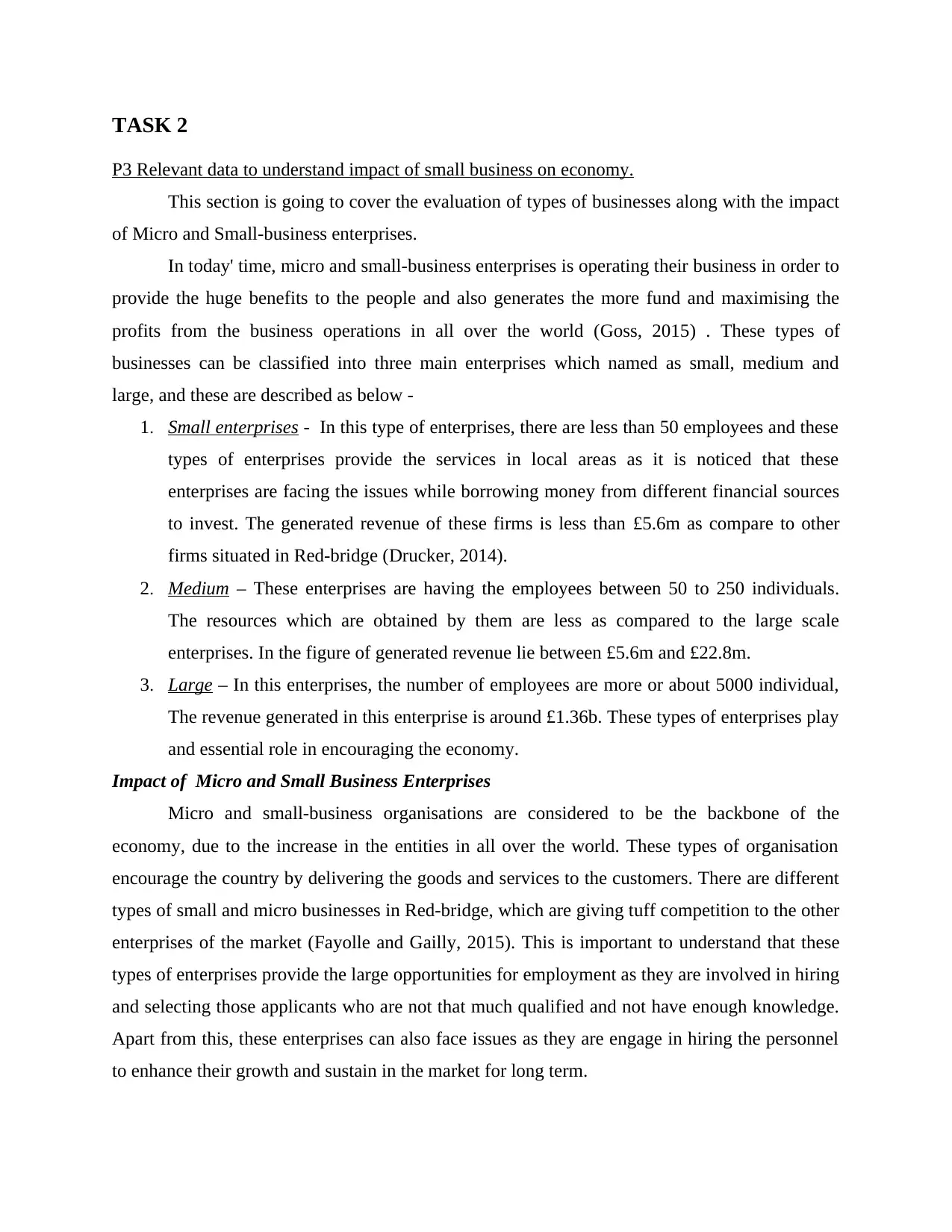
TASK 2
P3 Relevant data to understand impact of small business on economy.
This section is going to cover the evaluation of types of businesses along with the impact
of Micro and Small-business enterprises.
In today' time, micro and small-business enterprises is operating their business in order to
provide the huge benefits to the people and also generates the more fund and maximising the
profits from the business operations in all over the world (Goss, 2015) . These types of
businesses can be classified into three main enterprises which named as small, medium and
large, and these are described as below -
1. Small enterprises - In this type of enterprises, there are less than 50 employees and these
types of enterprises provide the services in local areas as it is noticed that these
enterprises are facing the issues while borrowing money from different financial sources
to invest. The generated revenue of these firms is less than £5.6m as compare to other
firms situated in Red-bridge (Drucker, 2014).
2. Medium – These enterprises are having the employees between 50 to 250 individuals.
The resources which are obtained by them are less as compared to the large scale
enterprises. In the figure of generated revenue lie between £5.6m and £22.8m.
3. Large – In this enterprises, the number of employees are more or about 5000 individual,
The revenue generated in this enterprise is around £1.36b. These types of enterprises play
and essential role in encouraging the economy.
Impact of Micro and Small Business Enterprises
Micro and small-business organisations are considered to be the backbone of the
economy, due to the increase in the entities in all over the world. These types of organisation
encourage the country by delivering the goods and services to the customers. There are different
types of small and micro businesses in Red-bridge, which are giving tuff competition to the other
enterprises of the market (Fayolle and Gailly, 2015). This is important to understand that these
types of enterprises provide the large opportunities for employment as they are involved in hiring
and selecting those applicants who are not that much qualified and not have enough knowledge.
Apart from this, these enterprises can also face issues as they are engage in hiring the personnel
to enhance their growth and sustain in the market for long term.
P3 Relevant data to understand impact of small business on economy.
This section is going to cover the evaluation of types of businesses along with the impact
of Micro and Small-business enterprises.
In today' time, micro and small-business enterprises is operating their business in order to
provide the huge benefits to the people and also generates the more fund and maximising the
profits from the business operations in all over the world (Goss, 2015) . These types of
businesses can be classified into three main enterprises which named as small, medium and
large, and these are described as below -
1. Small enterprises - In this type of enterprises, there are less than 50 employees and these
types of enterprises provide the services in local areas as it is noticed that these
enterprises are facing the issues while borrowing money from different financial sources
to invest. The generated revenue of these firms is less than £5.6m as compare to other
firms situated in Red-bridge (Drucker, 2014).
2. Medium – These enterprises are having the employees between 50 to 250 individuals.
The resources which are obtained by them are less as compared to the large scale
enterprises. In the figure of generated revenue lie between £5.6m and £22.8m.
3. Large – In this enterprises, the number of employees are more or about 5000 individual,
The revenue generated in this enterprise is around £1.36b. These types of enterprises play
and essential role in encouraging the economy.
Impact of Micro and Small Business Enterprises
Micro and small-business organisations are considered to be the backbone of the
economy, due to the increase in the entities in all over the world. These types of organisation
encourage the country by delivering the goods and services to the customers. There are different
types of small and micro businesses in Red-bridge, which are giving tuff competition to the other
enterprises of the market (Fayolle and Gailly, 2015). This is important to understand that these
types of enterprises provide the large opportunities for employment as they are involved in hiring
and selecting those applicants who are not that much qualified and not have enough knowledge.
Apart from this, these enterprises can also face issues as they are engage in hiring the personnel
to enhance their growth and sustain in the market for long term.
⊘ This is a preview!⊘
Do you want full access?
Subscribe today to unlock all pages.

Trusted by 1+ million students worldwide
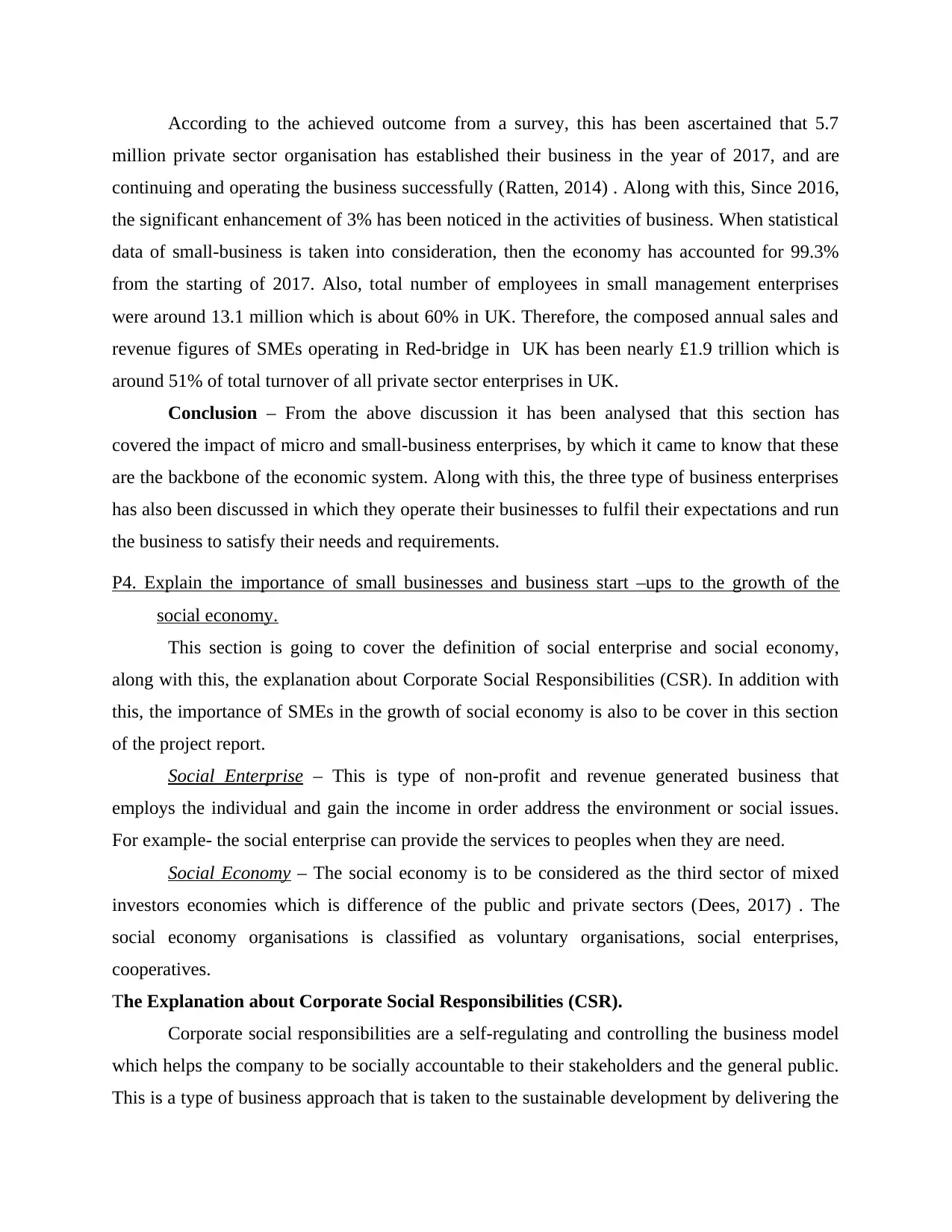
According to the achieved outcome from a survey, this has been ascertained that 5.7
million private sector organisation has established their business in the year of 2017, and are
continuing and operating the business successfully (Ratten, 2014) . Along with this, Since 2016,
the significant enhancement of 3% has been noticed in the activities of business. When statistical
data of small-business is taken into consideration, then the economy has accounted for 99.3%
from the starting of 2017. Also, total number of employees in small management enterprises
were around 13.1 million which is about 60% in UK. Therefore, the composed annual sales and
revenue figures of SMEs operating in Red-bridge in UK has been nearly £1.9 trillion which is
around 51% of total turnover of all private sector enterprises in UK.
Conclusion – From the above discussion it has been analysed that this section has
covered the impact of micro and small-business enterprises, by which it came to know that these
are the backbone of the economic system. Along with this, the three type of business enterprises
has also been discussed in which they operate their businesses to fulfil their expectations and run
the business to satisfy their needs and requirements.
P4. Explain the importance of small businesses and business start –ups to the growth of the
social economy.
This section is going to cover the definition of social enterprise and social economy,
along with this, the explanation about Corporate Social Responsibilities (CSR). In addition with
this, the importance of SMEs in the growth of social economy is also to be cover in this section
of the project report.
Social Enterprise – This is type of non-profit and revenue generated business that
employs the individual and gain the income in order address the environment or social issues.
For example- the social enterprise can provide the services to peoples when they are need.
Social Economy – The social economy is to be considered as the third sector of mixed
investors economies which is difference of the public and private sectors (Dees, 2017) . The
social economy organisations is classified as voluntary organisations, social enterprises,
cooperatives.
The Explanation about Corporate Social Responsibilities (CSR).
Corporate social responsibilities are a self-regulating and controlling the business model
which helps the company to be socially accountable to their stakeholders and the general public.
This is a type of business approach that is taken to the sustainable development by delivering the
million private sector organisation has established their business in the year of 2017, and are
continuing and operating the business successfully (Ratten, 2014) . Along with this, Since 2016,
the significant enhancement of 3% has been noticed in the activities of business. When statistical
data of small-business is taken into consideration, then the economy has accounted for 99.3%
from the starting of 2017. Also, total number of employees in small management enterprises
were around 13.1 million which is about 60% in UK. Therefore, the composed annual sales and
revenue figures of SMEs operating in Red-bridge in UK has been nearly £1.9 trillion which is
around 51% of total turnover of all private sector enterprises in UK.
Conclusion – From the above discussion it has been analysed that this section has
covered the impact of micro and small-business enterprises, by which it came to know that these
are the backbone of the economic system. Along with this, the three type of business enterprises
has also been discussed in which they operate their businesses to fulfil their expectations and run
the business to satisfy their needs and requirements.
P4. Explain the importance of small businesses and business start –ups to the growth of the
social economy.
This section is going to cover the definition of social enterprise and social economy,
along with this, the explanation about Corporate Social Responsibilities (CSR). In addition with
this, the importance of SMEs in the growth of social economy is also to be cover in this section
of the project report.
Social Enterprise – This is type of non-profit and revenue generated business that
employs the individual and gain the income in order address the environment or social issues.
For example- the social enterprise can provide the services to peoples when they are need.
Social Economy – The social economy is to be considered as the third sector of mixed
investors economies which is difference of the public and private sectors (Dees, 2017) . The
social economy organisations is classified as voluntary organisations, social enterprises,
cooperatives.
The Explanation about Corporate Social Responsibilities (CSR).
Corporate social responsibilities are a self-regulating and controlling the business model
which helps the company to be socially accountable to their stakeholders and the general public.
This is a type of business approach that is taken to the sustainable development by delivering the
Paraphrase This Document
Need a fresh take? Get an instant paraphrase of this document with our AI Paraphraser
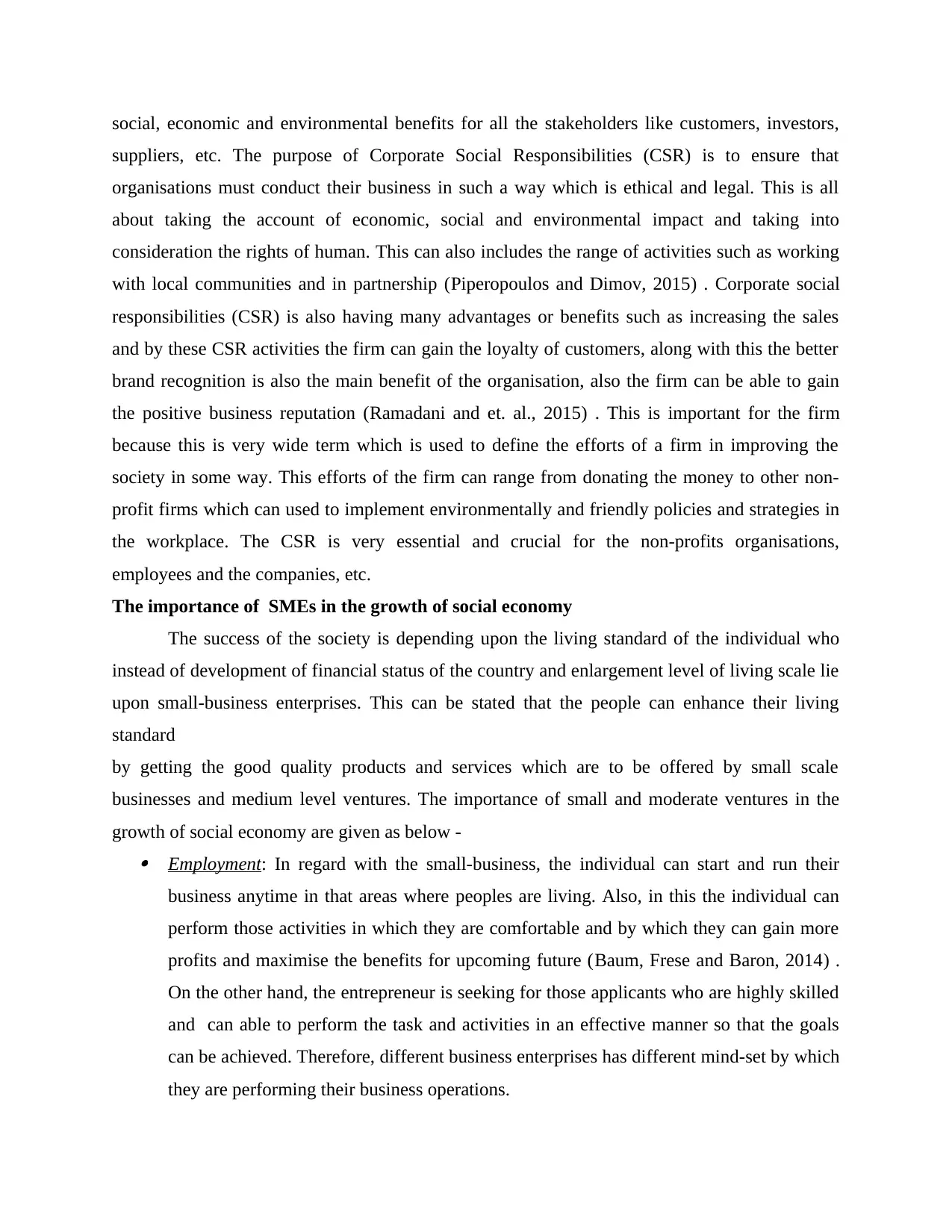
social, economic and environmental benefits for all the stakeholders like customers, investors,
suppliers, etc. The purpose of Corporate Social Responsibilities (CSR) is to ensure that
organisations must conduct their business in such a way which is ethical and legal. This is all
about taking the account of economic, social and environmental impact and taking into
consideration the rights of human. This can also includes the range of activities such as working
with local communities and in partnership (Piperopoulos and Dimov, 2015) . Corporate social
responsibilities (CSR) is also having many advantages or benefits such as increasing the sales
and by these CSR activities the firm can gain the loyalty of customers, along with this the better
brand recognition is also the main benefit of the organisation, also the firm can be able to gain
the positive business reputation (Ramadani and et. al., 2015) . This is important for the firm
because this is very wide term which is used to define the efforts of a firm in improving the
society in some way. This efforts of the firm can range from donating the money to other non-
profit firms which can used to implement environmentally and friendly policies and strategies in
the workplace. The CSR is very essential and crucial for the non-profits organisations,
employees and the companies, etc.
The importance of SMEs in the growth of social economy
The success of the society is depending upon the living standard of the individual who
instead of development of financial status of the country and enlargement level of living scale lie
upon small-business enterprises. This can be stated that the people can enhance their living
standard
by getting the good quality products and services which are to be offered by small scale
businesses and medium level ventures. The importance of small and moderate ventures in the
growth of social economy are given as below - Employment: In regard with the small-business, the individual can start and run their
business anytime in that areas where peoples are living. Also, in this the individual can
perform those activities in which they are comfortable and by which they can gain more
profits and maximise the benefits for upcoming future (Baum, Frese and Baron, 2014) .
On the other hand, the entrepreneur is seeking for those applicants who are highly skilled
and can able to perform the task and activities in an effective manner so that the goals
can be achieved. Therefore, different business enterprises has different mind-set by which
they are performing their business operations.
suppliers, etc. The purpose of Corporate Social Responsibilities (CSR) is to ensure that
organisations must conduct their business in such a way which is ethical and legal. This is all
about taking the account of economic, social and environmental impact and taking into
consideration the rights of human. This can also includes the range of activities such as working
with local communities and in partnership (Piperopoulos and Dimov, 2015) . Corporate social
responsibilities (CSR) is also having many advantages or benefits such as increasing the sales
and by these CSR activities the firm can gain the loyalty of customers, along with this the better
brand recognition is also the main benefit of the organisation, also the firm can be able to gain
the positive business reputation (Ramadani and et. al., 2015) . This is important for the firm
because this is very wide term which is used to define the efforts of a firm in improving the
society in some way. This efforts of the firm can range from donating the money to other non-
profit firms which can used to implement environmentally and friendly policies and strategies in
the workplace. The CSR is very essential and crucial for the non-profits organisations,
employees and the companies, etc.
The importance of SMEs in the growth of social economy
The success of the society is depending upon the living standard of the individual who
instead of development of financial status of the country and enlargement level of living scale lie
upon small-business enterprises. This can be stated that the people can enhance their living
standard
by getting the good quality products and services which are to be offered by small scale
businesses and medium level ventures. The importance of small and moderate ventures in the
growth of social economy are given as below - Employment: In regard with the small-business, the individual can start and run their
business anytime in that areas where peoples are living. Also, in this the individual can
perform those activities in which they are comfortable and by which they can gain more
profits and maximise the benefits for upcoming future (Baum, Frese and Baron, 2014) .
On the other hand, the entrepreneur is seeking for those applicants who are highly skilled
and can able to perform the task and activities in an effective manner so that the goals
can be achieved. Therefore, different business enterprises has different mind-set by which
they are performing their business operations.
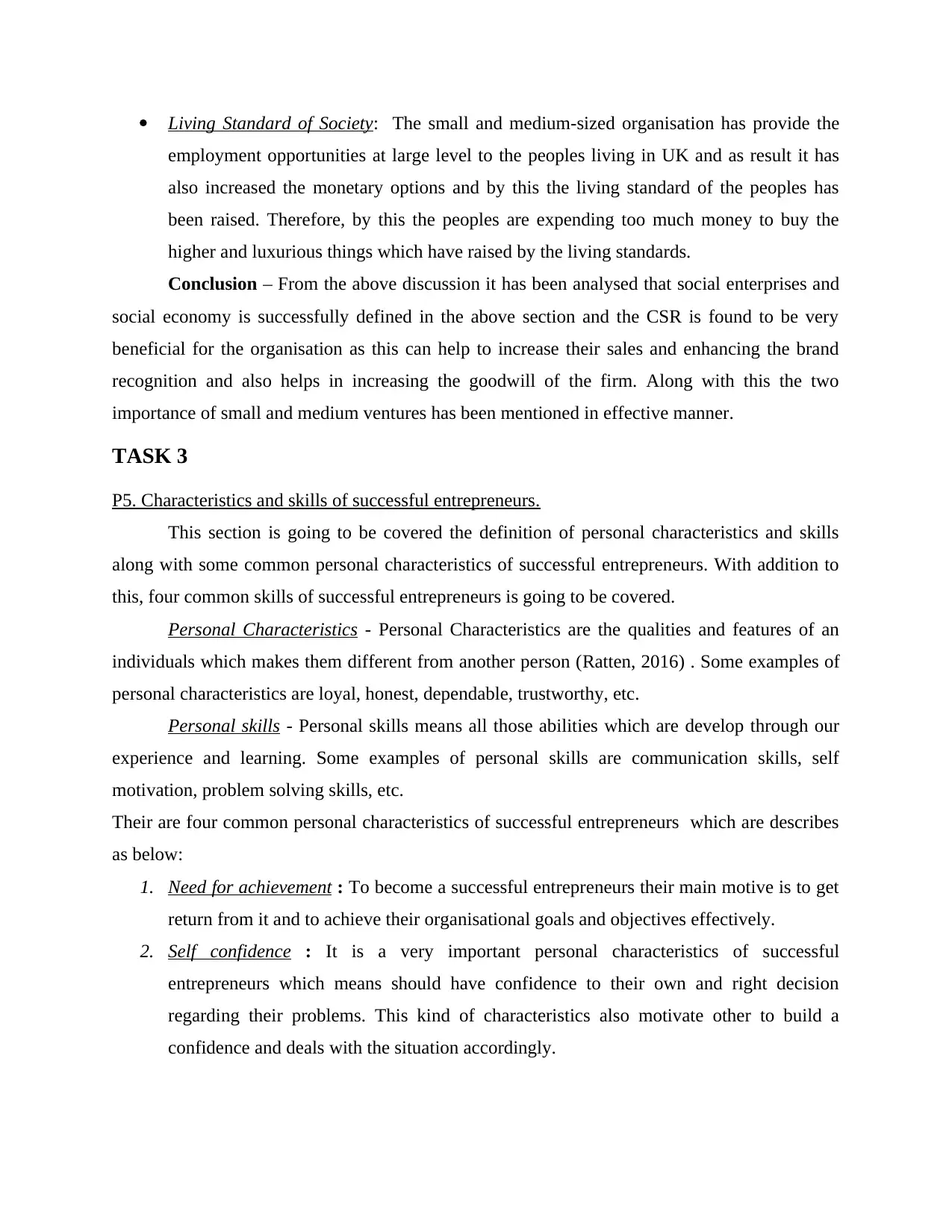
Living Standard of Society: The small and medium-sized organisation has provide the
employment opportunities at large level to the peoples living in UK and as result it has
also increased the monetary options and by this the living standard of the peoples has
been raised. Therefore, by this the peoples are expending too much money to buy the
higher and luxurious things which have raised by the living standards.
Conclusion – From the above discussion it has been analysed that social enterprises and
social economy is successfully defined in the above section and the CSR is found to be very
beneficial for the organisation as this can help to increase their sales and enhancing the brand
recognition and also helps in increasing the goodwill of the firm. Along with this the two
importance of small and medium ventures has been mentioned in effective manner.
TASK 3
P5. Characteristics and skills of successful entrepreneurs.
This section is going to be covered the definition of personal characteristics and skills
along with some common personal characteristics of successful entrepreneurs. With addition to
this, four common skills of successful entrepreneurs is going to be covered.
Personal Characteristics - Personal Characteristics are the qualities and features of an
individuals which makes them different from another person (Ratten, 2016) . Some examples of
personal characteristics are loyal, honest, dependable, trustworthy, etc.
Personal skills - Personal skills means all those abilities which are develop through our
experience and learning. Some examples of personal skills are communication skills, self
motivation, problem solving skills, etc.
Their are four common personal characteristics of successful entrepreneurs which are describes
as below:
1. Need for achievement : To become a successful entrepreneurs their main motive is to get
return from it and to achieve their organisational goals and objectives effectively.
2. Self confidence : It is a very important personal characteristics of successful
entrepreneurs which means should have confidence to their own and right decision
regarding their problems. This kind of characteristics also motivate other to build a
confidence and deals with the situation accordingly.
employment opportunities at large level to the peoples living in UK and as result it has
also increased the monetary options and by this the living standard of the peoples has
been raised. Therefore, by this the peoples are expending too much money to buy the
higher and luxurious things which have raised by the living standards.
Conclusion – From the above discussion it has been analysed that social enterprises and
social economy is successfully defined in the above section and the CSR is found to be very
beneficial for the organisation as this can help to increase their sales and enhancing the brand
recognition and also helps in increasing the goodwill of the firm. Along with this the two
importance of small and medium ventures has been mentioned in effective manner.
TASK 3
P5. Characteristics and skills of successful entrepreneurs.
This section is going to be covered the definition of personal characteristics and skills
along with some common personal characteristics of successful entrepreneurs. With addition to
this, four common skills of successful entrepreneurs is going to be covered.
Personal Characteristics - Personal Characteristics are the qualities and features of an
individuals which makes them different from another person (Ratten, 2016) . Some examples of
personal characteristics are loyal, honest, dependable, trustworthy, etc.
Personal skills - Personal skills means all those abilities which are develop through our
experience and learning. Some examples of personal skills are communication skills, self
motivation, problem solving skills, etc.
Their are four common personal characteristics of successful entrepreneurs which are describes
as below:
1. Need for achievement : To become a successful entrepreneurs their main motive is to get
return from it and to achieve their organisational goals and objectives effectively.
2. Self confidence : It is a very important personal characteristics of successful
entrepreneurs which means should have confidence to their own and right decision
regarding their problems. This kind of characteristics also motivate other to build a
confidence and deals with the situation accordingly.
⊘ This is a preview!⊘
Do you want full access?
Subscribe today to unlock all pages.

Trusted by 1+ million students worldwide
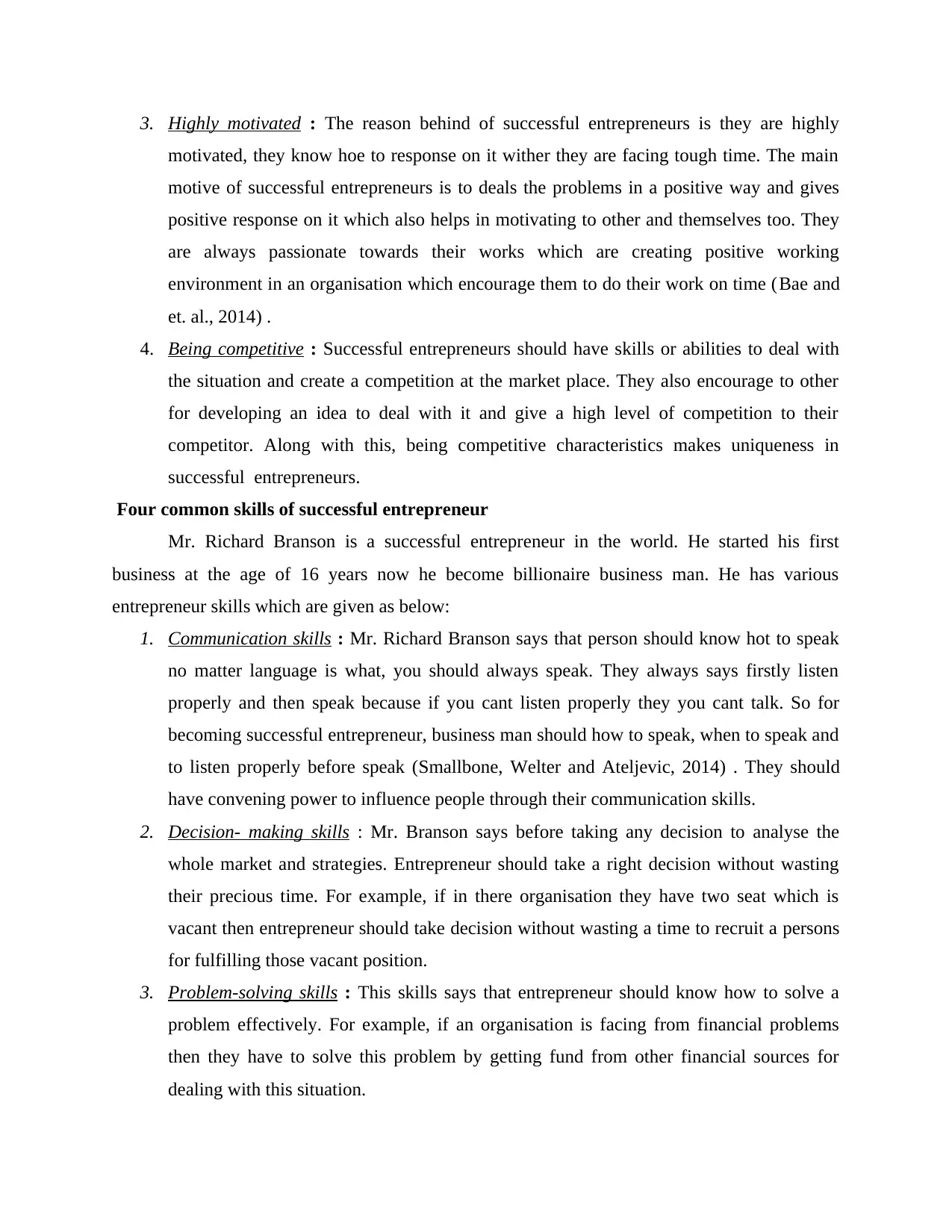
3. Highly motivated : The reason behind of successful entrepreneurs is they are highly
motivated, they know hoe to response on it wither they are facing tough time. The main
motive of successful entrepreneurs is to deals the problems in a positive way and gives
positive response on it which also helps in motivating to other and themselves too. They
are always passionate towards their works which are creating positive working
environment in an organisation which encourage them to do their work on time (Bae and
et. al., 2014) .
4. Being competitive : Successful entrepreneurs should have skills or abilities to deal with
the situation and create a competition at the market place. They also encourage to other
for developing an idea to deal with it and give a high level of competition to their
competitor. Along with this, being competitive characteristics makes uniqueness in
successful entrepreneurs.
Four common skills of successful entrepreneur
Mr. Richard Branson is a successful entrepreneur in the world. He started his first
business at the age of 16 years now he become billionaire business man. He has various
entrepreneur skills which are given as below:
1. Communication skills : Mr. Richard Branson says that person should know hot to speak
no matter language is what, you should always speak. They always says firstly listen
properly and then speak because if you cant listen properly they you cant talk. So for
becoming successful entrepreneur, business man should how to speak, when to speak and
to listen properly before speak (Smallbone, Welter and Ateljevic, 2014) . They should
have convening power to influence people through their communication skills.
2. Decision- making skills : Mr. Branson says before taking any decision to analyse the
whole market and strategies. Entrepreneur should take a right decision without wasting
their precious time. For example, if in there organisation they have two seat which is
vacant then entrepreneur should take decision without wasting a time to recruit a persons
for fulfilling those vacant position.
3. Problem-solving skills : This skills says that entrepreneur should know how to solve a
problem effectively. For example, if an organisation is facing from financial problems
then they have to solve this problem by getting fund from other financial sources for
dealing with this situation.
motivated, they know hoe to response on it wither they are facing tough time. The main
motive of successful entrepreneurs is to deals the problems in a positive way and gives
positive response on it which also helps in motivating to other and themselves too. They
are always passionate towards their works which are creating positive working
environment in an organisation which encourage them to do their work on time (Bae and
et. al., 2014) .
4. Being competitive : Successful entrepreneurs should have skills or abilities to deal with
the situation and create a competition at the market place. They also encourage to other
for developing an idea to deal with it and give a high level of competition to their
competitor. Along with this, being competitive characteristics makes uniqueness in
successful entrepreneurs.
Four common skills of successful entrepreneur
Mr. Richard Branson is a successful entrepreneur in the world. He started his first
business at the age of 16 years now he become billionaire business man. He has various
entrepreneur skills which are given as below:
1. Communication skills : Mr. Richard Branson says that person should know hot to speak
no matter language is what, you should always speak. They always says firstly listen
properly and then speak because if you cant listen properly they you cant talk. So for
becoming successful entrepreneur, business man should how to speak, when to speak and
to listen properly before speak (Smallbone, Welter and Ateljevic, 2014) . They should
have convening power to influence people through their communication skills.
2. Decision- making skills : Mr. Branson says before taking any decision to analyse the
whole market and strategies. Entrepreneur should take a right decision without wasting
their precious time. For example, if in there organisation they have two seat which is
vacant then entrepreneur should take decision without wasting a time to recruit a persons
for fulfilling those vacant position.
3. Problem-solving skills : This skills says that entrepreneur should know how to solve a
problem effectively. For example, if an organisation is facing from financial problems
then they have to solve this problem by getting fund from other financial sources for
dealing with this situation.
Paraphrase This Document
Need a fresh take? Get an instant paraphrase of this document with our AI Paraphraser
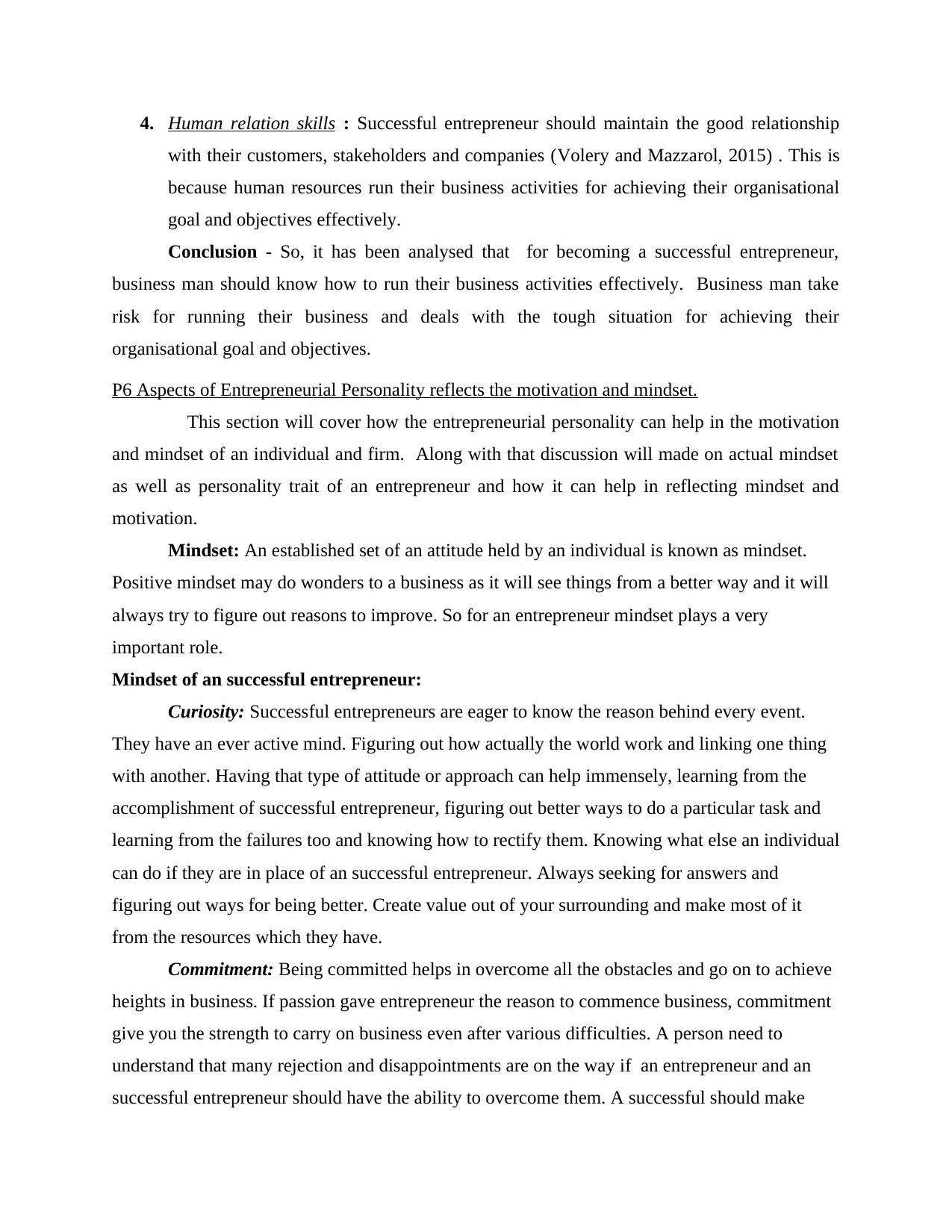
4. Human relation skills : Successful entrepreneur should maintain the good relationship
with their customers, stakeholders and companies (Volery and Mazzarol, 2015) . This is
because human resources run their business activities for achieving their organisational
goal and objectives effectively.
Conclusion - So, it has been analysed that for becoming a successful entrepreneur,
business man should know how to run their business activities effectively. Business man take
risk for running their business and deals with the tough situation for achieving their
organisational goal and objectives.
P6 Aspects of Entrepreneurial Personality reflects the motivation and mindset.
This section will cover how the entrepreneurial personality can help in the motivation
and mindset of an individual and firm. Along with that discussion will made on actual mindset
as well as personality trait of an entrepreneur and how it can help in reflecting mindset and
motivation.
Mindset: An established set of an attitude held by an individual is known as mindset.
Positive mindset may do wonders to a business as it will see things from a better way and it will
always try to figure out reasons to improve. So for an entrepreneur mindset plays a very
important role.
Mindset of an successful entrepreneur:
Curiosity: Successful entrepreneurs are eager to know the reason behind every event.
They have an ever active mind. Figuring out how actually the world work and linking one thing
with another. Having that type of attitude or approach can help immensely, learning from the
accomplishment of successful entrepreneur, figuring out better ways to do a particular task and
learning from the failures too and knowing how to rectify them. Knowing what else an individual
can do if they are in place of an successful entrepreneur. Always seeking for answers and
figuring out ways for being better. Create value out of your surrounding and make most of it
from the resources which they have.
Commitment: Being committed helps in overcome all the obstacles and go on to achieve
heights in business. If passion gave entrepreneur the reason to commence business, commitment
give you the strength to carry on business even after various difficulties. A person need to
understand that many rejection and disappointments are on the way if an entrepreneur and an
successful entrepreneur should have the ability to overcome them. A successful should make
with their customers, stakeholders and companies (Volery and Mazzarol, 2015) . This is
because human resources run their business activities for achieving their organisational
goal and objectives effectively.
Conclusion - So, it has been analysed that for becoming a successful entrepreneur,
business man should know how to run their business activities effectively. Business man take
risk for running their business and deals with the tough situation for achieving their
organisational goal and objectives.
P6 Aspects of Entrepreneurial Personality reflects the motivation and mindset.
This section will cover how the entrepreneurial personality can help in the motivation
and mindset of an individual and firm. Along with that discussion will made on actual mindset
as well as personality trait of an entrepreneur and how it can help in reflecting mindset and
motivation.
Mindset: An established set of an attitude held by an individual is known as mindset.
Positive mindset may do wonders to a business as it will see things from a better way and it will
always try to figure out reasons to improve. So for an entrepreneur mindset plays a very
important role.
Mindset of an successful entrepreneur:
Curiosity: Successful entrepreneurs are eager to know the reason behind every event.
They have an ever active mind. Figuring out how actually the world work and linking one thing
with another. Having that type of attitude or approach can help immensely, learning from the
accomplishment of successful entrepreneur, figuring out better ways to do a particular task and
learning from the failures too and knowing how to rectify them. Knowing what else an individual
can do if they are in place of an successful entrepreneur. Always seeking for answers and
figuring out ways for being better. Create value out of your surrounding and make most of it
from the resources which they have.
Commitment: Being committed helps in overcome all the obstacles and go on to achieve
heights in business. If passion gave entrepreneur the reason to commence business, commitment
give you the strength to carry on business even after various difficulties. A person need to
understand that many rejection and disappointments are on the way if an entrepreneur and an
successful entrepreneur should have the ability to overcome them. A successful should make
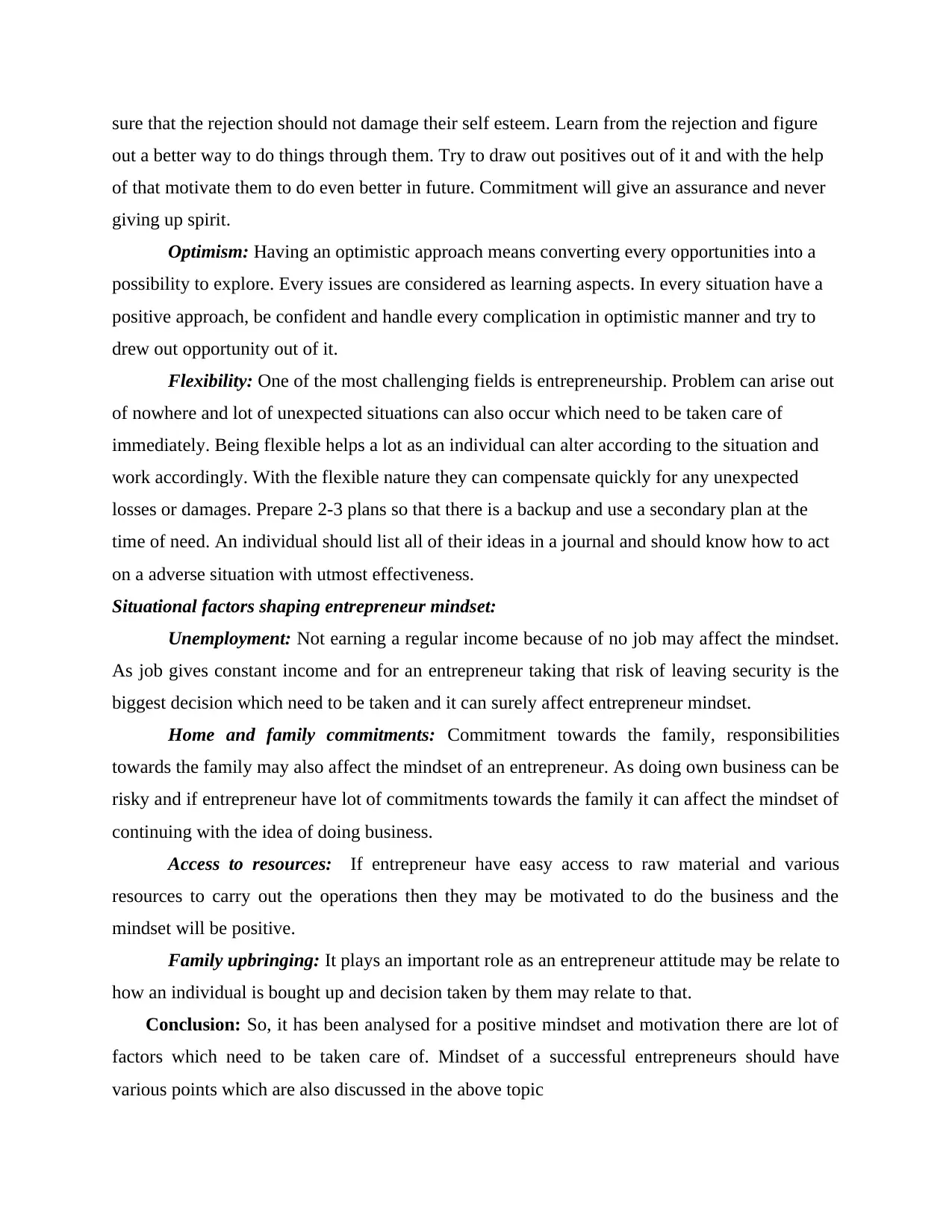
sure that the rejection should not damage their self esteem. Learn from the rejection and figure
out a better way to do things through them. Try to draw out positives out of it and with the help
of that motivate them to do even better in future. Commitment will give an assurance and never
giving up spirit.
Optimism: Having an optimistic approach means converting every opportunities into a
possibility to explore. Every issues are considered as learning aspects. In every situation have a
positive approach, be confident and handle every complication in optimistic manner and try to
drew out opportunity out of it.
Flexibility: One of the most challenging fields is entrepreneurship. Problem can arise out
of nowhere and lot of unexpected situations can also occur which need to be taken care of
immediately. Being flexible helps a lot as an individual can alter according to the situation and
work accordingly. With the flexible nature they can compensate quickly for any unexpected
losses or damages. Prepare 2-3 plans so that there is a backup and use a secondary plan at the
time of need. An individual should list all of their ideas in a journal and should know how to act
on a adverse situation with utmost effectiveness.
Situational factors shaping entrepreneur mindset:
Unemployment: Not earning a regular income because of no job may affect the mindset.
As job gives constant income and for an entrepreneur taking that risk of leaving security is the
biggest decision which need to be taken and it can surely affect entrepreneur mindset.
Home and family commitments: Commitment towards the family, responsibilities
towards the family may also affect the mindset of an entrepreneur. As doing own business can be
risky and if entrepreneur have lot of commitments towards the family it can affect the mindset of
continuing with the idea of doing business.
Access to resources: If entrepreneur have easy access to raw material and various
resources to carry out the operations then they may be motivated to do the business and the
mindset will be positive.
Family upbringing: It plays an important role as an entrepreneur attitude may be relate to
how an individual is bought up and decision taken by them may relate to that.
Conclusion: So, it has been analysed for a positive mindset and motivation there are lot of
factors which need to be taken care of. Mindset of a successful entrepreneurs should have
various points which are also discussed in the above topic
out a better way to do things through them. Try to draw out positives out of it and with the help
of that motivate them to do even better in future. Commitment will give an assurance and never
giving up spirit.
Optimism: Having an optimistic approach means converting every opportunities into a
possibility to explore. Every issues are considered as learning aspects. In every situation have a
positive approach, be confident and handle every complication in optimistic manner and try to
drew out opportunity out of it.
Flexibility: One of the most challenging fields is entrepreneurship. Problem can arise out
of nowhere and lot of unexpected situations can also occur which need to be taken care of
immediately. Being flexible helps a lot as an individual can alter according to the situation and
work accordingly. With the flexible nature they can compensate quickly for any unexpected
losses or damages. Prepare 2-3 plans so that there is a backup and use a secondary plan at the
time of need. An individual should list all of their ideas in a journal and should know how to act
on a adverse situation with utmost effectiveness.
Situational factors shaping entrepreneur mindset:
Unemployment: Not earning a regular income because of no job may affect the mindset.
As job gives constant income and for an entrepreneur taking that risk of leaving security is the
biggest decision which need to be taken and it can surely affect entrepreneur mindset.
Home and family commitments: Commitment towards the family, responsibilities
towards the family may also affect the mindset of an entrepreneur. As doing own business can be
risky and if entrepreneur have lot of commitments towards the family it can affect the mindset of
continuing with the idea of doing business.
Access to resources: If entrepreneur have easy access to raw material and various
resources to carry out the operations then they may be motivated to do the business and the
mindset will be positive.
Family upbringing: It plays an important role as an entrepreneur attitude may be relate to
how an individual is bought up and decision taken by them may relate to that.
Conclusion: So, it has been analysed for a positive mindset and motivation there are lot of
factors which need to be taken care of. Mindset of a successful entrepreneurs should have
various points which are also discussed in the above topic
⊘ This is a preview!⊘
Do you want full access?
Subscribe today to unlock all pages.

Trusted by 1+ million students worldwide
1 out of 15
Related Documents
Your All-in-One AI-Powered Toolkit for Academic Success.
+13062052269
info@desklib.com
Available 24*7 on WhatsApp / Email
![[object Object]](/_next/static/media/star-bottom.7253800d.svg)
Unlock your academic potential
Copyright © 2020–2025 A2Z Services. All Rights Reserved. Developed and managed by ZUCOL.





